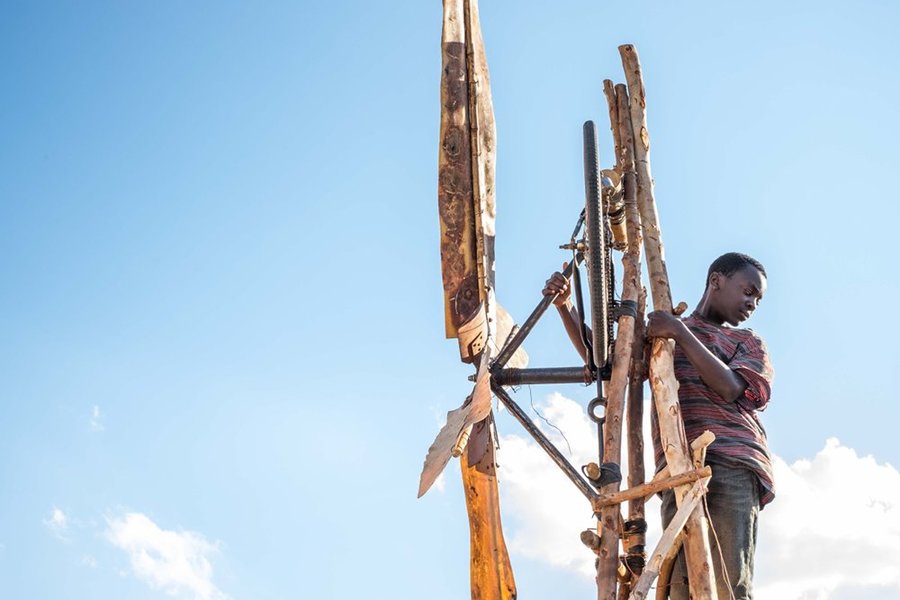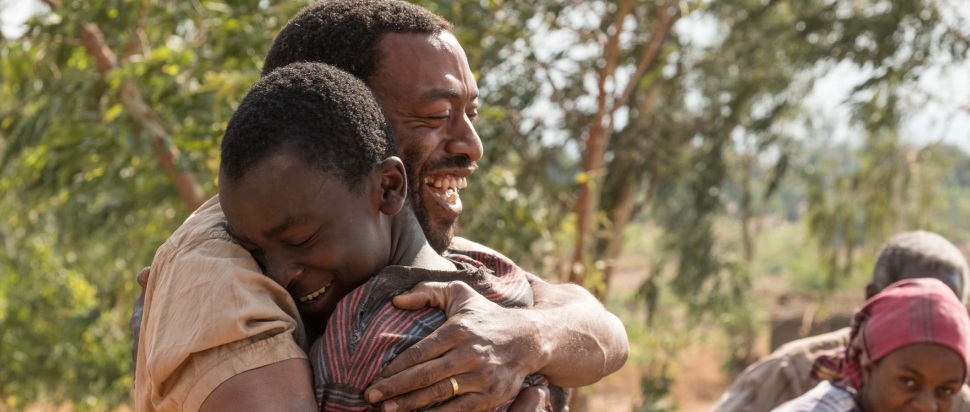Chiwetel Ejiofor on The Boy Who Harnessed the Wind
The tale of how a Malawian schoolboy saved his village by building a wind turbine from bits of scrap is the basis of The Boy Who Harnessed the Wind. Chiwetel Ejiofor tells us why he wanted to bring William Kamkwamba's inspirational story to the screen
You can barely go a month without a major Hollywood actor trying the director’s chair out for size. The inflated egos of stars like Mel Gibson, George Clooney and Ben Affleck have more often than not resulted in turgid vanity projects rather than great works of cinema, but a handful of recent films have broken this pattern. Bradley Cooper’s A Star is Born was a moving hand-held take on that classic melodrama. Directing seems a fine fit, too, for Paul Dano, whose soulful family drama Wildlife was one of last year’s most underappreciated gems. Jonah Hill, meanwhile, delivers the annoyingly good coming-of-age film Mid90s in April. This month, the star-turned-surprisingly-assured-director is British-Nigerian actor Chiwetel Ejiofor, who’s bringing the incredible true story of William Kamkwamba to a screen near you – the small screen, that is, for The Boy Who Harnessed the Wind will find its home on Netflix.
Ejiofor’s handsome, thoughtful feature tells how William, as the film’s title puts it, harnessed the wind. In 2001, Malawi was hit by floods followed by a devastating drought; crops across the country failed, including those on the Kamkwamba family farm. The household was reduced to one meager meal a day, but William – a smart, resourceful 14-year-old – struck upon a possible solution to the crisis while reading a book on energy in his school’s library. Using his father’s bicycle, a bike light dynamo and some scrap salvaged from the nearby junkyard, he engineered a small wind turbine capable of generating electricity to power a pump that could irrigate the parched cornfields and provide his family with a much-needed early harvest.
Sitting down with Ejiofor in Berlin ahead of his film’s European premiere, he explains he got the jump on the story after a friend of his attended the LA book launch of William’s memoir (co-written by Bryan Mealer) back in 2009, and insisted Ejiofor pick up the book. They were on the money: Ejiofor was smitten with William’s story. “As I was reading it I initially thought it was something that I would try and adapt, you know? But then in the process, I thought, ‘well, actually, I need to direct this as well.’”
Where did this urge to direct come from, we ask? “I just felt like I resonated so much with the themes, especially in terms of my own experiences in Nigeria, which is very different to Malawi in many ways, but has strong similarities, especially in the rural communities.” He was also struck by the visual possibilities of the book. “I hadn't really seen anything that had captured Malawi in this way, cinematically. So I was excited to try and explore that as authentically as I could. And I felt... I felt like... like I was well placed to, um... to try and give it a go.”

Do we detect some trepidation? Despite a glittering career in Hollywood, with roles in everything from sci-fi classics (Children of Men) to Oscar-winners (12 Years a Slave) to Marvel blockbusters (Doctor Strange), Ejiofor clearly had nerves about his first gig behind the camera. These apprehensions, he explains, stem from deep feelings of responsibility. “I was so moved by William's story, and the fact that he was able to live in the solution to his problems.” As well as doing William’s story justice, he also wanted to do right by Malawi – a nation whose image in the West, like that of most nations in Africa, is formed from a succession of outdated cliches. “I wanted to capture the book’s authentic description of Malawi, and of the dynamics there that are very raw, very truthful. And through the rawness you can really appreciate the beauty and the achievement of what William did there, and the optimism of it and the hopefulness of it.”
It's easy to see why Ejiofor would be so taken with William’s story. As well as being an uplifting underdog tale, it also provides a nifty little meta-narrative to this actor’s own attempt to make his first feature. “I was making a story about somebody that's doing something against all the odds, and I felt the film itself represents doing something against all the odds too,” says Ejiofor. “I wanted to make this film in Malawi, I wanted to make this film about William Kamkwamba and I'm trying to get everybody on board to try and tell this story. So William’s story is internally inspiring me to make the film about his story. The whole experience felt for me like, ‘I'm trying to build this windmill.’”
There are several elements that increased the level of difficulty for Ejiofor. First of all, he’s acting as well as directing, playing William’s traditionalist father, Trywell. Second, he’s resisted the temptation of going the more commercial route of having the cast speak entirely in English. “We're still in a world where foreign language is a scary prospect for some,” he says. “But it seemed very clear in the nature of the story that one had to authentically represent the village community, otherwise the film would lose a layer of its texture, and its integrity essentially.”
In the two decades Ejiofor has been acting, he’s had plenty of opportunities to observe great filmmakers at work. His first big screen role was for Steven Spielberg, no less, in Amistad, while over the years he’s worked with directors as wide-ranging as Spike Lee (Inside Man, She Hate Me), Ridley Scott (American Gangster, The Martian) and Woody Allen (Melinda and Melinda). He jokingly describes his acting career as “on-the-ground vocational director training”. A couple of Ejiofor’s previous bosses actually took a look at his early cuts. “The two people I showed the film to when I was in the editing phase were Stephen Frears [who cast Ejiofor in 2002’s Dirty Pretty Things, his first lead role] and Steve McQueen [director of 12 Years a Slave, for which Ejiofor received an Oscar nomination], and that was great in terms of being able to talk about the film with people who I hugely admire and whose experience and work is so brilliant and vast.”
You’d struggle to find two more different directors from whom to seek council. We’re curious, what were their notes? “I mean, neither Stephen nor Steve – neither Steve – they didn't really give notes exactly. They just talked about what impacted them about the film, what really spoke to them, and that was very helpful.”
For Frears, it was the politics of the story that were paramount. “The story of Malawi and what William achieved is a kind of microcosm idea,” says Ejiofor, “but it takes place within this macro idea of a global community and what the kind of global communities represent. And so if we're talking about issues like climate change and its impact on the environment, of course the West has a big part to play in those dynamics.”
McQueen was more invested in the father-son dynamic between Ejiofor’s Trywell and William (wonderfully played by newcomer Maxwell Simba). It’s certainly a complex relationship, one that’s both loving and fraught with tension. Afterall, Trywell wants to be the one who rescues his family and community from poverty and famine, but he has neither the resilience nor the education to help solve their problems. His curious, inventive, forward-thinking son does.
Ejiofor agrees that it’s a key element to the film. “For me there was something about this idea of a patriarch that was vitally important. Trywell comes to realise that this patriarchal system is imperfect, deeply flawed, and that actually looking to his family – looking to his son and to his wife for support – changes the relationship that he has to his patriarchal society, to the point that he understands that he has to be in service to the community and to his son, that his role is not to dominate those circumstances because that has failed. But his role is to somehow be more of a community member of his family. To me, that's a very significant and important journey.”
The Boy Who Harnessed the Wind’s worldwide launch on Netflix will give this rousing film a huge potential audience, but Ejiofor realises that reaching smaller communities in Malawi and other African nations will require a bit more work. “Obviously with Netflix, we are able to tell this story to a lot of people. The film is meant to be inspiring, so to inspire us, in the West, with this hopeful, optimistic story, that's great. But you can imagine what this film might mean in communities where this film really represents them and their experiences and their challenges. My hope is to find ways to reach beyond the end of the broadband cable and actually get it out into those communities.”
The Boy Who Harnessed the Wind will be streaming on Netflix from 1 Mar
